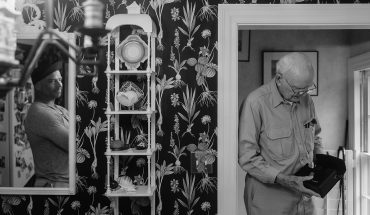
by Lori D. R. Wiggins | photography by Gabriel Nelson
If you ever share a space with Mary D. Williams, listen. And learn. What you’ll experience is a soul-electrifying blend of traditional gospel songs laced with slave spirituals. They’re woven into sobering, yet often upbeat, lessons about how music both sustained and empowered slaves, energized the Civil Rights Movement and spawned social change. “Music is a part of every era of our lives. Music can be heard when speech cannot,” Williams says.
Alternating between sage storyteller and contralto songstress, Williams shares how slaves spoke, lamented and hoped with each other—and God—through tunes that floated over the fields for hundreds of miles and generations beyond. She shares how the Fisk Jubilee Singers, a black a cappella ensemble, introduced African-American talent to a world accustomed to minstrel shows. She shares how the Wings Over Jordan Choir, the first black professional choir, used its songs of praise to support the Civil Rights Movement and codify the instrumentation and harmonies that now distinguish gospel music. “They used the music of the enslaved as a weapon of social change,” says Williams. The gospel singer, historian and educator believes this music can build community now, just as it did then.
Local roots
Williams was raised in rural Garner, the oldest of two children to John and Ellen Dobbin. She grew up on the knees of grandparents who lived in Johnston County—a place still notorious for its billboard welcome until the 1970s: “This is Klan Country, Love It or Leave It.” She remembers facing discrimination while shopping with her grandmother; in those moments, her grandmother simply pulled Williams closer. But back at home, Williams would hear her grandmother in the kitchen, humming tunes, with a moan. No words. “‘When you moan, the devil don’t know what you’re talking about,’” she recalls her grandmother saying.
Williams’ father sang in The Dependable Quintet for as long as she can remember—he still sings in the church choir today. She credits a middle school chorus teacher for urging her to sing. She graduated from Garner High School in 1979, then spent a year at college before returning home to work. In 1982, Williams married Alvin D. Williams; they had three sons, each six years apart, then two grandsons. Over the years, Williams balanced family life with a 30-year career as a medicaid case manager. And all the while, Williams was “still performing music near and dear to me,” she says. She sang at churches and community events, made award-winning rounds on the gospel-fest circuit and recorded three solo albums. Even so, she says, “I felt I didn’t belong.” Her repertoire of slave spirituals and traditional gospel songs was different from the contemporary gospel flooding festivals and airwaves. But Williams persisted, rejecting suggestions she follow the crowd.
In 2005, Williams met historian Timothy B. Tyson, author of Blood Done Sign My Name, which explores the 1970 murder of a 23-year-old black veteran by three white men in his hometown of Oxford, North Carolina, at a community racial reconciliation event at William Peace University. She sang; he discussed his book. The two joined forces soon after, traveling the country on conversation-style book tours. The next year, Williams and Tyson were asked to develop a course curriculum to help bridge the racial divides that lingered in the wake of the Duke lacrosse case. Called The South in Black and White: Politics, History, and Culture Along the Color Line in the 20th Century South, the class was first taught at the Hayti Heritage Center in Durham to students from Duke, N.C. Central University and UNC-Chapel Hill, and is now a course offering to students from Durham Technical Community College as well as community members.
In 2015, Williams graduated with honors from UNC-Chapel Hill with a degree in American Studies, and minors in history and African-American studies. On Mother’s Day this year, she earned a master’s degree in Folklore from Carolina. And her unique talent for storytelling through music has earned her recognition far beyond the Triangle.
Teaching with her talents
“Every time I work with teachers, I want Mary there,” says Christie Norris, director of Carolina K-12, a Public Humanities program at UNC-Chapel Hill charged with educating teachers through professional development opportunities. This past summer, Norris enlisted Williams to present Carolina Voices: Exploring the History and Heritage of the Tar Heel State. In it, she explored aspects of a shared history often swept under the rug. “She’s helping teachers invest in and engage with hard history in a welcoming and productive way,” Norris said. “Music can empower, and also disarm us, so we can come together around tough issues.” In July, Williams sang songs of “protest and promise” at the John F. Kennedy Center for the Performing Arts in Washington, D.C., as a performer at the Smithsonian Folklife Festival. “Mary has a way of explaining the music without being didactic, and follows it with a gorgeous voice that leaves the audience captivated and enthralled,” says Sabrina Lynn Motley, the festival’s director.
Whether she’s holding a mic at a podium or emerging from the wings, Williams’ presentations are always interactive, and always begin with song. The audience is encouraged to join in. After guests sang along for a portion of Down in the Valley to Pray at her Kennedy Center performance, Williams explained why: “These songs started with individuals and built a community just as we just did,” she says. “No one handed you any music or compositions or lyrics, but we passed this among ourselves and we now have this one thing in common. It allowed us to become a community.”
From the Oxford American’s Statewide Singing Circle at A.J. Fletcher Opera Theater to a recent trip to Montpellier, France, as part of Pavillon Populaire’s I Am A Man exhibit, Williams’ indelible mastery of music and history has carved a place for her in spaces she never imagined she’d enter. “I’m honored,” said Williams. “I’m just so overwhelmed by the opportunities; I could not have written this for myself. I’m just so in awe of the Lord giving me the gift and then Him giving me these opportunities to use my gift.”



